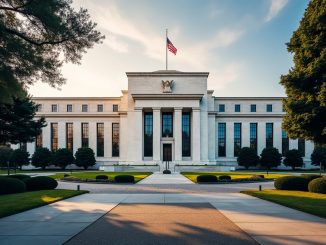Elon Musk, the CEO of Tesla (TSLA) and SpaceX, has publicly supported the notion that U.S. presidents should have more influence over the Federal Reserve’s monetary policies, following the election of Donald Trump as President-elect.
This endorsement came via a simple yet poignant social media interaction where Musk responded to a post by Senator Mike Lee, R-Utah, who advocated for the Federal Reserve to be under presidential direction. Sen. Lee ended his post with “#EndtheFed.”
Musk’s agreement, indicated by the “100” emoji, signals his alignment with a perspective that challenges the traditional independence of the Federal Reserve.
— Elon Musk (@elonmusk) November 8, 2024
The Federal Reserve, tasked with managing the nation’s monetary policy, has historically operated independently to avoid political influence that might prioritize short-term gains over long-term economic stability. This independence is seen as crucial for making decisions on interest rates and other monetary policies based on economic data and forecasts rather than political considerations. However, Trump’s previous tenure was marked by his public criticisms of Federal Reserve Chair Jerome Powell, whom he appointed, for not lowering interest rates as he desired, illustrating a preference for presidential oversight over monetary policy.
During the 2024 presidential campaign, Trump openly expressed his belief that he should have a say in the Federal Reserve’s actions, arguing that his business acumen would be beneficial in monetary policy decisions. This stance has reignited discussions about the autonomy of the central bank, especially in light of Musk’s support.
Musk’s own interactions with regulatory bodies have often been contentious, reflecting a broader critique of regulatory environments that he believes stifle innovation.
Musk’s endorsement of Trump’s potential influence over the Federal Reserve could be seen in the context of his broader advocacy for a regulatory environment more conducive to rapid technological advancement. Given Musk’s significant involvement in industries like electric vehicles, space exploration, and social media, his interest in how monetary policy could affect these sectors is clear. Lower interest rates, for instance, could reduce borrowing costs for companies like Tesla, facilitating expansion and investment in new technologies.
The implications of such a shift in Federal Reserve governance could have a noticeable impact:
– Market Concerns: Financial markets might react with volatility to a perceived reduction in the Fed’s independence, fearing that decisions might be swayed by political cycles rather than economic needs.
– Policy Shifts: If Trump were to influence the Federal Reserve directly, there might be a push towards policies that favor immediate economic stimulation, potentially at the cost of inflation or long-term economic health.
– Regulatory Environment: Musk’s support for less regulation aligns with Trump’s deregulatory approach during his first term, which could extend to financial regulations, potentially affecting how the Fed operates regarding oversight of banks and other financial institutions.
Jerome Powell’s recent statement that he would not resign if asked by Trump adds another layer to this evolving narrative, suggesting a potential for ongoing tension between the White House and the Federal Reserve.
As the dynamics of this relationship unfold, stakeholders from Wall Street to Main Street will watch closely, understanding that the balance between political oversight and economic independence at the Federal Reserve could significantly shape the economic landscape for years to come.
h/t CNBC
- Bulenox: Get 45% to 91% OFF ... Use Discount Code: UNO
- Risk Our Money Not Yours | Get 50% to 90% OFF ... Use Discount Code: MMBVBKSM
Disclaimer: This page contains affiliate links. If you choose to make a purchase after clicking a link, we may receive a commission at no additional cost to you. Thank you for your support!




Leave a Reply